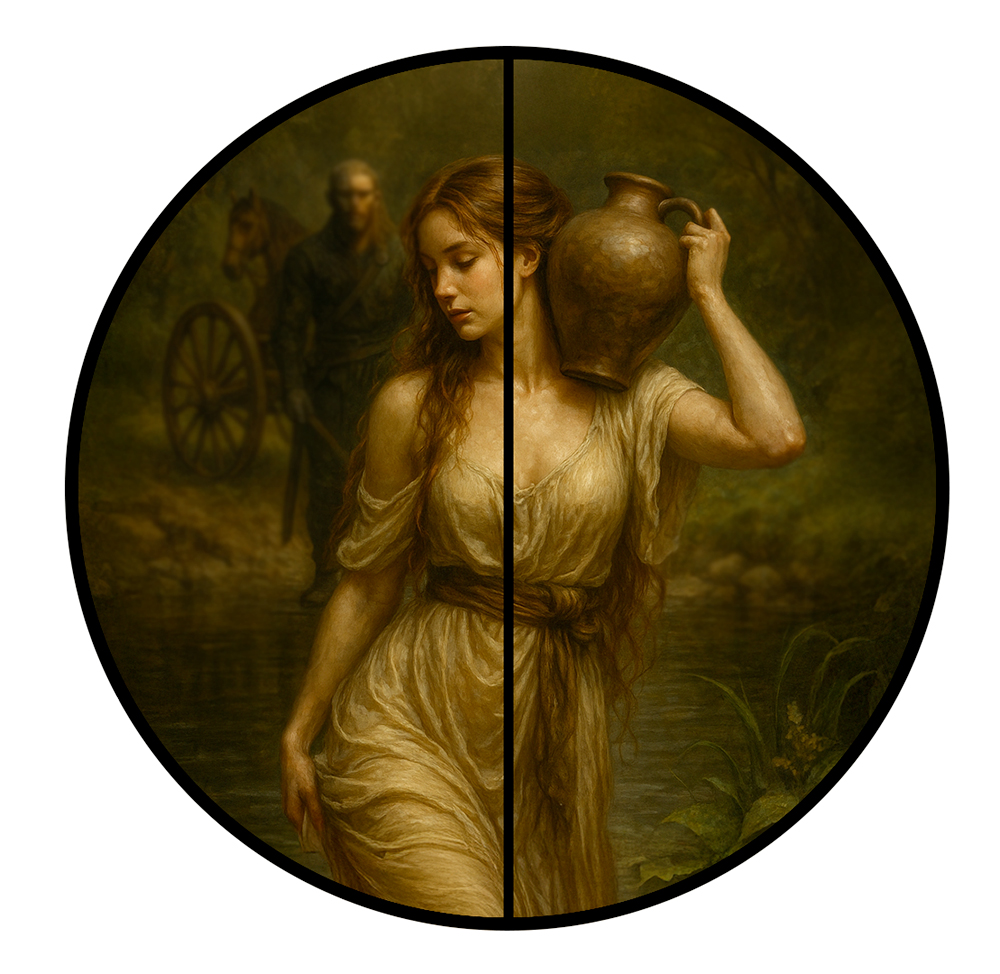Acts of Sent Away Ones 8
And well-holding men collected together the Crown-Wreathed One ("Stephen"), and they made a mega striking/blow upon self.33
λυμαίνομαι - stigmatize, inflict indignities, maltreating
And Sheol kept maltreating the Summoned Assembly throughout the Households; he who is leading in, he who is dragging along both men and women, he kept handing over into a watching.
λῡμαίνομαι - outrage, maltreat, esp. of personal injuries, scourging, binding
Core sense: to outrage, maltreat, injure, dishonor.
Construction: typically takes an accusative object (person, thing, or abstract).
- Physical injury — scourging, binding, maltreatment (e.g. Herodotus).
- Moral insult — dishonoring or outraging a person (e.g. Sophocles, Euripides).
- Civic / forensic — harming laws, speeches, institutions (e.g. Lysias, Demosthenes).
- General spoil / harm — disease harming the body, spoiling food, ruining houses, wasting resources (e.g. Hippocrates, Xenophon, Theophrastus, Epicurus, Aristotle).
Therefore of a truth indeed, the ones who have been sown through, passed through, those who are gospelizing the Logos Ratio,
And Horse Lover ("Philip"), he who has climbed down into the City of the Guard Tower ("the Samaria"), he kept proclaiming the Anointing to themselves.34

And the Multitude kept turning their attention to the things that are being spoken of by the Horse Lover, with one passion within the Hearing of Themselves, and to look at the Signs which he was making.
For multitudinous of the ones who are holding spirits, unclean ones which are shouting/resounding with a mega voice, they kept coming out, and multitudes who have been side-dissolved and limping were treated.
And she became, much joy within the City, that one.
μαγεύων mageuōn - he who is being a Magi, Skilled in Magic
And a certain man by a name of Hearing ("Simon") was pre-existing within the City, he who is being a Magus/Enchanter, and he who is throwing out of position the Herd of the Guard Tower, he who is speaking his own self to be someone mega.to whom they all kept giving heed, away from a little one as far as a mega one, those who are saying, "This one is the Powerful One of the God, she who is being called the Mega One!"35

μαγεία, the theology of the Magians
And they kept giving heed to self, because of themselves having been thrown out of position/joint for a considerable amount of chronological time by the Magician Theology.36And when they trusted in the Horse Lover, he who is gospelizing around to the Queen of the God and the Name of Salvation, an anointed one, they kept dipping/plunging, both men and women.
And the Hearing, he, himself also trusted, and he who was plunged was being him who is adhering firmly to the Horse Lover, he who is gazing attentively at both signs and those who are becoming mega powerful ones, he kept being thrown out of place.
And those who heard, the Sent Away Ones within Foundations of Peace, that the Guard Tower took the Word of the God, sent away toward themselves Small Stone and Favored,

anyone who climbed down, they offered prayers around to themselves in such a manner that they might take hold of a spirit, a holy one.
ὑπῆρχον εἰς τὸ ὄνομα - Pre-Existing into the Name
For that which has fallen upon, was not yet being on anyone of themselves, and only those who have plunged were pre-existing into the Name of the Master, Salvation.37At that time they were setting the Hands upon themselves, and they were taking hold of a spirit, a holy one.
And the Hearing, he who perceived that the Spirit is given straight across through the Setting On of the Hands of the Sent Away Ones, bore toward themselves money,
he who is saying, "Give also to myself the Authority, this one, so that whomever I should set the Hands upon he may take hold of a holy spirit."
And Small Stone spoke toward himself, "May the Silver Piece of yourself united with yourself be into a loss/perdition because you customarily practiced through money to win/acquire the Gift the God!"

gaining or acquiring her through money
"Credit Cards also accepted, or you can use our app for even more convenience!"εὐθύς - straight
There is no portion to yourself, nor lot within the Logos Ratio, this one! For the Heart of yourself, she is not straight direct opposite to the God!ἐπίνοια - invention, device, notion
Therefore change the mind away from the Malicious Evil of yourself, this one, and entreat earnestly to the Master if perhaps she will be sent away to yourself, the Invention of the Heart of yourself!For he who is being into a gall of bitterness and a bond of injustice I am perceiving yourself!"
And he who has been separated, the Hearing, said, "You, yourselves beg beyond myself toward the Master, in such a manner that nothing which you have spoken should come upon myself!
Therefore indeed of a truth, the ones who have protested and those who have chattered the Logos Ratio of the Master were turning back around into Foundations of Peace, they were gospelizing multitudes, even unwalled villages of the Watchmen.
A Lonesome Road
And an angel of a master chattered toward Horse Lover, he who is saying, "Stand up and lead across toward noon/midday on the Road, the one who is climbing down away from Foundation of Peace into Stronghold. She, herself is a deserted one.
And he who stood up led across, and behold! a man, a Scorched-Face One ("Aitho-Ops"), a castrated one, a lord of Queen ("Candace"),38 of a queen of Scorched Faces, him who was being upon all the Royal Treasury of herself, who had come, he who will kiss in worship into Foundation of Peace,

will worship into standing up
Even he was being him who is turning back around, and he who is sitting down upon the War-Chariot of himself and he was recognizing the Prophet, He Is Liberator ("Isaiah"),
And the Spirit said to the Horse Lover, "Come forward and be glued to the War-Chariot, this one."

what I am reading?""Glue to this chariot!"
And the Horse Lover, he who ran toward, he heard himself, he who is recognizing He Is Liberator the Prophet, and he spoke, "Are you really recognizing the things which you are reading?"
I will guide me
And the one said, "For how can I be able to unless someone will guide myself?" And he sent for the Horse Lover, he who has climbed up to sit in sync with self.περιοχή - circumference, containing
And the Circumference of the Writing, her whom he was recognizing, she, herself was being, "As a sheep up to a slaughter he was driven and as a voiceless lamb opposite to the one who cut short himself, thus he is not opening the Mouth of Himself!
א beginning ἄφωνος - voiceless/dumb
κείρω - cut short/off (hair)ending תאת = instrument of cutting, plowing (#855)
Within the Humiliation, the Separation of himself she was lifted up! Who will describe in detail the Generation of himself, because she is being raised up away from the Earthly One, the Zoe-Life of himself!"
And he who has been separated, the Castrated One, to the Horse Lover he said, "I am in lack/want of yourself— around to whom is the Prophet speaking this thing? Around to his own self or around to a certain different one?"

Eternal Self: ת → א
And the Horse Lover, he who opened the Mouth of himself, and he who began away from the Writing, this one, he gospelized to self the Salvation.You were castrated for "a kingdom"
And as they kept leading across over the Road, they came upon certain water. And the Castrated One is bringing to light, "Behold! water! What is hindering myself from being plunged?"
And he ordered the War-Chariot to stand by, and both sides climbed down into the Water, both the Horse Lover and the Castrated One and he plunged himself.
Castrated One Went Away
And as soon as they climbed up from out of the Water a spirit of a master snatched away the Horse Lover, and he did not perceive himself any longer the Castrated One, because he kept leading across the Road of himself, he who is rejoicing.
And Horse Lover was found into Ravager ("Azotus") and he who is traversing across kept gospelizing all of the Cities up to the Coming of Himself into Dicatorship ("Caesarea").
Footnotes
ἀναίρεσις, -εως, ἡ (from ἀναιρέω)
-
Action of lifting up, removal — e.g., of the slain after battle (Thuc. 2.34; 3.109, 113; Ant. 137.26; Lys. 191.11), of bones from the pyre (Eur. Or. 404).
-
Taking up arms, enlistment (Plat. Leg. 814a).
-
Undertaking, assumption, taking upon oneself (Plat. Leg. 847b).
-
Removal, destruction, abolition — of cities, walls (Xen. Hell. 6.3.5; Dem. 385.3); esp. of laws = abrogation (Plut. Cic. 34).
-
Refutation (direct, opposed to διαίρεσις = indirect, by distinction: Arist. Soph. El. 33.7).
-
In biblical/NT usage: “taking up, adopting” an exposed infant (Acts 7:21); by extension, “owning, acknowledging.”
κοπετός is a noun deriving from κόπτω (“to strike, cut”). Here are the main senses:
1. Physical / literal
-
A blow or strike on oneself — especially the chest or head as a mourning gesture.
-
A heavy strike / smite — e.g., hitting, chopping, pounding (can extend to animals, objects, doors, or tools).
-
Labor or effort — abstract extension from repeated striking or exertion; “toil, fatigue, hard work.”
2. Figurative / idiomatic
-
Grief or lamentation — the action of striking oneself or beating the breast/head in sorrow (human mourning).
-
Exertion / trouble / difficulty — metaphorical “toil” or “hardship” from intensive labor or emotional stress.
(cf. LSJ κοπετός, κομμός, κόπτω)
τὸν χριστόν — acc. sing. of χριστός (from χρίω, “to anoint”)
-
Literal / object sense: “the anointing” — the oil or act of anointing (LXX Leviticus 21:10).
-
Person / title: “the anointed one” — a king, priest, or the Messiah; in NT usage, the Messiah, Jesus Christ (Matt. 2:4; Luke 2:26).
(context determines)
cf. LSJ χριστός
Acts 8:10 — textual deletion regarding “the Great One”
-
Critical / early manuscripts (Nestle 1904; Westcott-Hort 1881; Tischendorf 8th ed.):
ᾧ προσεῖχον πάντες ἀπὸ μικροῦ ἕως μεγάλου λέγοντες: Οὗτός ἐστιν ἡ δύναμις τοῦ Θεοῦ ἡ καλουμένη Μεγάλη
– literally: “to whom all gave heed, from the least to the greatest, saying, ‘This is the power of God, she who is called Great.’”
– καλουμένη = participle, “called/summoned,” emphasizes that the title is a designation. -
Later / majority-text manuscripts (Byzantine Majority Text 2005; Greek Orthodox Church; Textus Receptus editions):
– read simply ἡ μεγάλη (“the Great”), omitting the participle.
Why did they delete this?
Theology of Magicians
μαγεία, ἡ theology of the Magians, μ. ἡ Ζωροάστρου Pl. Alc. 1.122a.
The term μαγεία in its literal and original sense refers to the learning and religious service of the Magi among the Persians. As noted by Plato in Alcibiades I 122a, this practice is described as θεῶν θεραπεία, meaning "service of the gods." It encompasses both scholarly knowledge and ritual observances performed by the Magi, the priestly caste of Zoroastrian Persia. In that context, μαγεία is understood as a positive, divinely sanctioned religious practice rather than mere superstition or trickery.
In addition to its theological and scholarly sense, μαγεία came to denote magic, sorcery, or witchcraft more generally. In historical and literary texts, such as Thucydides H.P. 9.15.7, the term describes actions or spells that produce astonishment, manipulate natural forces, or influence spirits. This practical or magical sense could range from ritualized charms to deceptive arts, reflecting a broader Greek usage where μαγεία includes both extraordinary religious rites and more everyday manipulations of supernatural power.
Classical scholarship and scholia provide a further technical distinction. According to the scholia on Iliad 1.81, μαγεία specifically involves invoking or conjuring good gods for beneficial purposes, whereas γοητεία denotes invoking evil powers for harmful purposes. Thus, μαγεία straddles the line between positive religious practice and the exercise of magical power, highlighting the dual nuance of the term as both a theological and a practical concept. In Acts 8:10, the dative plural ταῖς μαγείαις refers to effects that could be interpreted either as literal sorcery or as miraculous phenomena causing displacement/astonishment (ἐξεστακέναι).
(cf. LSJ and Pape: μαγεία)
Translators appear not to understand ὑπῆρχον "to make beginning/take initiative" and seem to drop it or flatten it out of existence altogether. In Greek, “they have been plunged (baptized) in” would be expressed in the perfect passive (or middle-passive) indicative of βαπτίζω: ἐβαπτίσθησαν ἐν. This is not in the text, but is made up.
What is written?
βεβαπτισμένοι ὑπῆρχον εἰς
"those who were dipped were taking intiative into"
There is no prepostion ἐν "in" but rather εἰς "into."
ὑπῆρχον εἰς + acc./dative – Used with an accusative object and εἰς + accusative/dative to indicate proactive or contributive action. For example ὑ. εὐεργεσίας εἴς τινα or τινι is literally, “take the initiative in [doing] kindnesses to someone.” The accusative marks the benefit or service (εὐεργεσίας), and the dative (τινι) marks the recipient. (Demosthenes, 19.280; Aeschines, 2.26) The construction emphasizes intentional action on behalf of another, rather than mere existence of the favor.
(cf. LSJ ὑπάρχω A.4)
Κανδάκης (Candace): a dynastic title used for the queens or queen mothers of the Kingdom of Kush (Nubia). Not a personal name, but a formal designation equivalent to “queen” or “regent.” Greek sources (e.g., Acts 8:27) transliterated the local Nubian/Meroitic title. The term signifies a ruling queen or queen mother with political authority; English translations often render it “Ethiopian queen” as a geographical reference rather than a personal name.